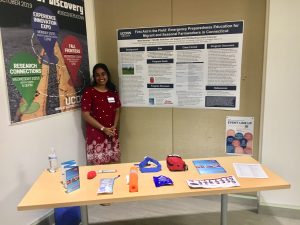Mitali Banerjee '20, Physiology & Neurobiology, Molecular & Cell Biology
Summer 2019 UConn Co-op Legacy Fellow
First Aid in the Field: Emergency Preparedness Education for Migrant and Seasonal Farmworkers in Connecticut
Project Profile
 As a 2019 UConn Co-op Legacy Fellow, I had the opportunity to develop a community emergency preparedness program for migrant and seasonal farm workers in Connecticut. In creating and implementing this program, which provides free CPR, first aid, and bleeding control classes in English and Spanish, I have been able to help provide workers with training in how to recognize and respond to basic medical emergencies in the moments before professional assistance is available.
As a 2019 UConn Co-op Legacy Fellow, I had the opportunity to develop a community emergency preparedness program for migrant and seasonal farm workers in Connecticut. In creating and implementing this program, which provides free CPR, first aid, and bleeding control classes in English and Spanish, I have been able to help provide workers with training in how to recognize and respond to basic medical emergencies in the moments before professional assistance is available.
As one of the most underserved populations in society, migrant and seasonal farm workers often encounter many challenges regarding access to healthcare and other services. These challenges, along with their increased risk of occupational injuries due to the nature of their work, are persistent problems that affect the overall health and wellbeing of the farm worker population. Although training in CPR and basic first aid topics does not replace the need for medical care, learning this information can help workers to better respond to emergencies and potentially save a life.
I started developing the training program with this goal in mind. In the process, I learned even more about the types of challenges that workers experience in accessing different resources. Many of these challenges are related to cultural and socioeconomic barriers, both of which contribute to healthcare disparities that affect farm workers across the country.
As an aspiring healthcare provider, I hope to contribute towards addressing these disparities and the larger social issues that they represent. My experiences with the farms have given me the opportunity to interact with many workers in Connecticut, and I hope to build upon this by finding new ways to serve others in the future.
In the meantime, I look forward to offering more classes at area farms so that more workers can participate in the program. In anonymous evaluations from past classes, many of the workers stated that they found training in life-saving skills to be very helpful, and expressed interest in learning more in the future. Seeing their responses, and their enthusiasm to participate in the classes, has truly been the best part of this experience.
Acknowledgements
I would like to acknowledge the invaluable support of the UConn Co-op Legacy Fellowship Program, which provided everything needed to transform this initiative into a reality. I would especially like to thank Ms. Melissa Berkey, Assistant Director of the UConn Office of Undergraduate Research, for all of her continued support throughout my time as a fellow, as well as my faculty advisor Dr. Anne Gebelein, Associate Director of El Instituto: Institute of Latina/o, Caribbean, and Latin American Studies, for her mentorship over the past several years. In addition, I would like to thank Ms. Shannon McClure, Coordinator of the UConn Migrant Farm Worker Clinics, Mr. Yu-Mon Luis Chang and Mr. Manuel Rivera at the CT State Department of Labor, and all the other community partners who connected me to different farms. I am very grateful to have had the opportunity to create this program, and appreciate the support of the many people who helped to make it all possible. Thank you!